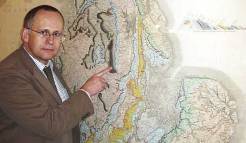
The difference between scepticism and denial is the criterion of reasonable doubt, says Ted Nield.
Geoscientist 20.6 June 2010
When issues become charged, they also become polarised; and when those issues are scientific, conflict ensues because doubting, sceptical science and the dogma of belief make uneasy bedfellows. Nevertheless, scientists are only human and alas share our species’ natural tendency to form gangs when threatened, and even to act in ways that do violence to what should be a dispassionate calling.
On more than one occasion, following the report of a minority viewpoint, orthodox heavyweights have buttonholed your editor, uttering words to the effect of “I would really like to sit down with you and convince you!”. Although flattering, this betrays, I think, a basic problem that scientists have both with news in general, and the nature of “belief”.
First,
Geoscientist is a magazine and is interested in what is news. Journalists are, of course, also interested in “truth”: but only in so far as they accurately reflect the news. Whether the ideas that make the news are themselves “correct”, in the way that a scientist would define it, is another matter entirely, and not awfully relevant. It is for scientists, not journalists, to decide what is scientifically correct.
One definition of “news” is “something that someone doesn’t want you to print”, so all good news stories annoy someone. A science reporter is often drawn into scientific discussions, rehearsing the arguments of the opposition, to see how each side responds. At this point a common reaction from the orthodox is: “Ah, you’re being sceptical now, because you’re a journalist”. Well, that may indeed be so; but isn’t it also scientists’ job to be forever sceptical?
Nullius in verba and all that?
This question comes down to what constitutes “reasonable” doubt. We distinguish
Young Earth Creationism from science by YECs’ unreasonable determination to ignore overwhelming evidence. Because there is no effective counterargument to unreasonable doubt, YECs are true “denialists” because no evidence will ever convince them. The word “denyer” always marks out adherents of a different dogma - “denyers of Christ”, for example – or those whose contrary convictions surpass what a rational person would consider reasonable – as with denyers of the Holocaust, or evolution. The fact that denyers then attempt to don the mantle of respectability by styling themselves “sceptics” only goes to show that language is an early casualty of politics.
This month we publish
a riposte to
Cliff Ollier’s feature (March 2010) which cast doubt on whether the world’s ice sheets could “collapse” - and caused a furore among glacial geologists (while drawing applause from others). It is for you now to judge of their respective claims. Yet while there remains little reasonable doubt that anthropogenic climate change is real, much perfectly reasonable doubt remains over much else. We shall continue therefore to publish views that run counter to consensus, but not beyond what is reasonable and with “facts are sacred” as our guiding principle.
Geoscientist is a forum for debate, because its readers want discussion, not preaching. But we also firmly believe that the best way truly to convince is to treat people as adults and thrash out the issues out in public. What we will never become is a pulpit for unreason.
- Online Special – see Geoscientist Online for Gerta Keller’s latest on why the Chicxulub Crater cannot be the smoking gun of the K-T impact, despite recent attempts to enforce “science by democracy”.